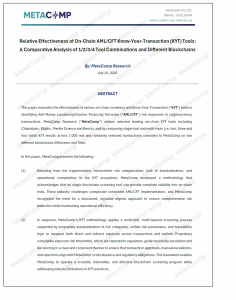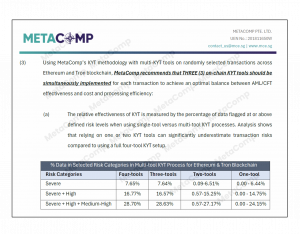
1 in 4 Risky Transactions May Be Missed — MetaComp Study Finds Limited KYT Tools Insufficient for Blockchain Compliance
New research on stablecoin flows from MetaComp urges institutions to adopt multi-layered KYT methodology to address critical gaps in AML/CFT compliance.
SINGAPORE, SINGAPORE, July 17, 2025 /EINPresswire.com/ -- As stablecoins are poised to take centre stage in cross-border payments, a new study by MetaComp Pte Ltd (MetaComp), a Major Payment Institution licensed by the Monetary Authority of Singapore (MAS), evaluates the effectiveness of leading on-chain Know-Your-Transactions (KYT) tools in detecting Anti-Money Laundering (AML) and Counter Financing of Terrorism (CFT) risks across major blockchains . The findings highlight critical vulnerabilities in how crypto transactions are screened for financial crime risk.
The study analysed 7,000 live and randomly selected transactions on Ethereum and Tron using four leading KYT providers, Chainalysis, Elliptic, Merkle Science, and Beosin. By comparing the results across single-tool, dual-tool, three-tool, and four-tool screening configurations. Findings revealed that up to 25% of high-risk transactions were not flagged when relying on only one or two KYT tools, exposing critical gaps in transaction monitoring and underscoring the risks of insufficient tooling in regulated digital asset environments.
Screening Practices Under Scrutiny
The study focused on real-world transactions involving USDT and USDC, the two most widely used stablecoins in global payment flows, across Ethereum and Tron blockchains. MetaComp’s analysis compared the effectiveness of using one to four KYT tools per transaction and found that a three-tool approach significantly improves risk detection while maintaining processing speed suitable for real-time environments. This offers a scalable and practical model for institutional compliance.
“For institutions operating in a regulated environment, especially those dealing with stablecoin flows, it is no longer sufficient to rely on a single tool for transaction screening,” said Tin Pei Ling, Co-President of MetaComp. “This research provides evidence that layering multiple KYT tools can significantly reduce blind spots and strengthen the integrity of on-chain payment ecosystems. We hope these findings will help elevate industry standards for on-chain risk monitoring and support the development of a more trusted digital finance environment.”
Key Findings: Accuracy Improves with Layered Screening
The study found that relying on a single KYT tool can result in up to 25% of high-risk transactions being missed, meaning 1 in 4 potentially suspicious transactions may go undetected due to limited screening coverage. These high-risk transactions often involved exposure to sanctioned wallet addresses, stolen funds, darknet-linked activity, coin mixers, and fraud-related schemes, all of which typically trigger reporting or escalation requirements.
In contrast, a three-tool screening model lowered the false clean rate to below 0.10%, while maintaining screening speeds under two seconds per transaction. This makes it a practical and scalable for production environments requiring near-instant results.
The study also identified five systemic weaknesses across the industry that contribute to screening inconsistencies: fragmented risk coverage across different tools, inconsistent risk categorisation, a lack of standardised outputs, operational complexity in reconciling results, and processing latency introduced by multi-tool setups.
The research further observed that Ethereum-based transactions showed lower AML/CFT risk signals than Tron in the sampled dataset. Specifically, 6.95% of Tron transactions were flagged as severe risk compared to 0.70% on Ethereum, with more than 20% of Tron transactions assessed at medium-high risk or worse.
While the study did not evaluate blockchain protocols themselves, the findings underscore the need for differentiated compliance strategies based on network-specific transaction behaviour.
“We’re not comparing blockchain technologies, but rather the nature of the transactional risk flowing through them,” added Tin Pei Ling. “Each KYT provider sees different parts of the risk landscape. For institutions, relying on a single perspective is no longer viable – reconciling multiple signals is critical to maintaining regulatory trust. Our goal is to close the gaps with defensible infrastructure.”
Stablecoins in Focus for Institutional Risk Management
USDT and USDC were selected for this study given their prominence in institutional use cases such as remittance, settlement, and merchant payments.
MetaComp recommends that a minimum of three on-chain KYT tools be simultaneously implemented for each transaction to strike an optimal balance between AML/CFT effectiveness, cost, and processing efficiency. Analysis shows that using only one or two tools can result in up to 25% of high-risk transactions being incorrectly cleared — exposing critical compliance gaps. While three tools provide effective baseline coverage, MetaComp has adopted a four-tool setup across its CAMP and StableX platforms, raising the standard to deliver enhanced risk detection and stronger regulatory alignment.
Methodology and Scope
The analysis was conducted using 7,000 real and randomly selected transactions involving USDT and USDC across the Ethereum and Tron blockchains. The sample transactions were drawn from live blockchain data on June 26 and 27, 2025, with all MetaComp internal activity intentionally excluded to preserve research independence.
Screening was conducted using four KYT tools – Chainalysis, Elliptic, Merkle Science, and Beosin – selected for their data coverage, typology specialisation, regional intelligence, and integration capabilities.
To address the limitations of fragmented vendor data, MetaComp applied a proprietary screening methodology comprising:
1. Standardised risk category mapping
2. Unified risk parameter configuration aligned with regulatory expectations
3. A multi-tool screening workflow that includes initial screening, direct exposure assessment, transaction-level exposure analysis and wallet-level risk profiling
While the dataset represents a point-in-time snapshot, the findings offer directional insight into how different KYT screening configurations perform under real-world conditions. The decision to limit the sample to two stablecoins and two blockchains reflects MetaComp’s focus on real-world cross-border flows and the screening costs associated with running multi-tool setups. The research also provides a foundation for broader industry dialogue around how digital asset firms can meet rising regulatory expectations while maintaining operational speed, clarity, and cost efficiency.
MetaComp acknowledges the time-bound scope of the analysis and encourages further study to support broader generalisations.
-END-
About MetaComp
MetaComp is a leading licensed cross-border FX and digital assets infrastructure provider headquartered in Singapore and licensed by the Monetary Authority of Singapore (MAS) under the Payment Services Act 2019. Operating on a P2B2C (platform-to-business/partners-to-clients) model, MetaComp empowers institutions, payment service providers, fintechs, and global enterprises to navigate the evolving cross-border payments and the digital asset economy with confidence.
With a strong emphasis on compliance, security, and institutional-grade infrastructure, MetaComp delivers an end-to-end suite of digital finance solutions — including OTC and exchange trading, fiat payment rails, regulated digital asset custody, and prime brokerage services. MetaComp is a subsidiary of Alpha Ladder Finance Pte. Ltd., a MAS-licensed Capital Markets Services (CMS) licensee and Recognised Market Operator (RMO).
Through its proprietary Client Asset Management Platform (CAMP), MetaComp provides a secure, integrated environment that bridges traditional finance with digital assets.
MetaComp’s latest innovation, StableX, is a next-generation cross-border FX and liquidity routing infrastructure designed to simplify and accelerate global fund flows. Powered by stablecoins and USD, StableX intelligently optimises multi-currency conversions and settlements, enabling faster, more cost-effective, and highly competitive cross-border transactions. As the FX layer within CAMP, StableX combines the programmability of digital assets with the reliability of regulated infrastructure, delivering a scalable, compliant and seamless ecosystem for the future of global finance.
To learn more about MetaComp and its regulated infrastructure and solutions, visit www.mce.sg or www.linkedin.com/company/metacompsg/.
MetaComp PR
MetaComp
email us here
Visit us on social media:
LinkedIn
Instagram
Facebook
YouTube
X
MetaComp
Distribution channels: Banking, Finance & Investment Industry, Business & Economy, Education, Technology, World & Regional
Legal Disclaimer:
EIN Presswire provides this news content "as is" without warranty of any kind. We do not accept any responsibility or liability for the accuracy, content, images, videos, licenses, completeness, legality, or reliability of the information contained in this article. If you have any complaints or copyright issues related to this article, kindly contact the author above.
Submit your press release




